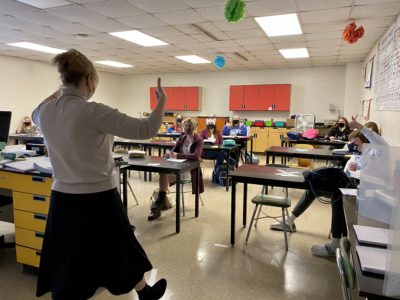
A promise by Republican leaders to raise starting teacher pay to $35,000 could be fulfilled this legislative session if Republican Senate leader Phil Berger gets his way.
After being reelected to the top Senate position at yesterday’s first day of session for 2015, he touched on education in a speech to the Senate floor.
“They elected us to improve public education and reform student outcomes,” he said.
Part of that effort to improve public education reaches back to last year when lawmakers promised to raise the base salary for teachers from $33,000 to $35,000 during the next two years.
In Berger’s speech, he reiterated his intention for the Senate to keep that promise. He also promised that the legislative body would continue to improve education, saying that a good education system was integral to bringing business to the state.
In closing remarks at the end of the Senate session, Republican Lieutenant Governor Dan Forest talked about the importance of digital learning in the state, something for which he has been a staunch proponent.
“Through your leadership, we are right on the verge of making North Carolina a leader in education innovation,” he said. “…I believe North Carolina will be the first state in the country to have every classroom connected to high-speed broadband Internet, one-to-one devices in the hands of every child, and teachers who know how to leverage this technology to our kids for new frontiers.”
In 2013, the General Assembly passed a bill stating its intent to transition North Carolina schools from traditional textbooks to digital learning by 2017. A full digital learning plan is being developed by the Friday Institute for Educational Innovation at North Carolina State University, though preliminary recommendations were released by the Institute this month.
“The N.C. Digital Learning Plan will enable us to move from a one-size-fits-all approach to education to customized education for every child to make the transition away from expensive, high stakes testing to mastery-based learning,” Forest said.
In the House of Representatives, Republican Rep. Leo Daughtry led off his speech nominating Republican Rep. Tim Moore speaker by referencing Moore’s dedication to quality education.
“He…realizes that education is the great equalizer,” he said of Moore, who went on to easily be elected speaker.
In Moore’s speech to the House floor, he announced jobs as the number one priority this session, touching briefly on education when he mentioned the need for the House to come up with ideas for public-private partnerships with organizations like the YMCA to address after-school care.
In an interview after the House adjourned, Republican Rep. Paul Stam — who was reelected to the number two leadership position in the House — mentioned a few upcoming education topics that could be discussed this session. They included differentiated pay (performance pay), expansion of opportunity scholarships (also known as vouchers), and a proposal for a pilot program to allow high school students to go to class later in the day, “so they will learn more.”
He was undeterred by news of a possible nearly-$200 million shortfall.
“We were here when there was supposedly a $4.5 billion shortfall,” he said. “The shortfall this year, like right now, is about 1 percent (of the state’s budget).”
The General Assembly’s top economist says revenues are $199 million below where they were expected through last month. To put the shortfall in perspective, the budget signed by Republican Governor Pat McCrory in August was $21.1 billion.
In a joint press conference, Democratic leaders mentioned some of their plans for education this upcoming session as well. In particular, Democratic Senate minority leader Dan Blue noted last session’s teacher raise and said it didn’t go far enough, leaving veteran teachers behind.
Democratic House leader Rep. Larry Hall said those veterans are key to the state’s educational system. We understand we have to keep those core professionals to move our schools forward,” he said.
Blue also said greater efforts must be undertaken to bring teacher salary to the national average and to align education with jobs so that today’s students would be qualified for the careers they will face once they leave school. He also touched on President Barack Obama’s plan to make community college free for all students, saying it was an idea worth discussing.
In a joint press conference, the Republican leaders addressed the question of pay for veteran teachers.
“We’ll look at ways we can reward our best teachers,” Berger said, adding that awarding performance would be the focus of efforts related to veteran teacher pay.
Moore said that last session’s pay raise was targeted towards starting teachers because the State Department of Public Instruction indicated that was the area where turnover was the biggest problem. He said he would like to see lawmakers do more for veteran teachers.
The House and Senate also adopted rules for this session. As part of its new rules, the House broke up its education committee into three separate groups: K-12, community college and University.
Click for list of Senate committee assignments.
House committee assignments are not yet available.
Recommended reading



